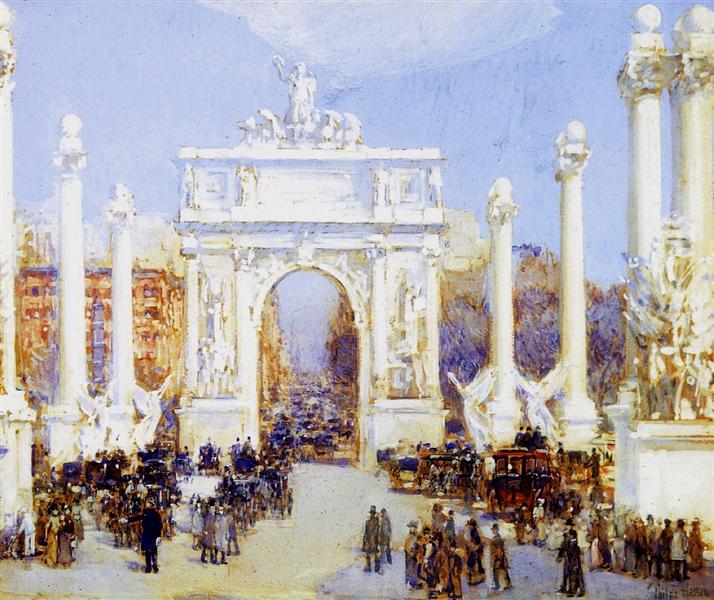Opis
Childe Hassam's painting "Dewey's Arch" (1900) is an exquisite example of the impressionist style that characterizes the artist's work. The painting depicts the famous triumphal arch erected in New York City to commemorate Admiral George Dewey's victory at the Battle of Manila during the Spanish-American War. In this work, Hassam captures not only a historical event, but also the spirit of an era in a vibrant and ever-changing city.
The composition of the painting is remarkably dynamic. The arch, placed almost in the centre of the work, stands majestically, dominating the scene. The structure is decorated with flags and garlands, symbols of celebration that suggest an atmosphere of joy and national unity. The use of diagonal lines creates a sense of movement, directing the viewer's gaze towards the arch and around it. The human figures, although not the main focus of the work, are skilfully integrated into the composition. These silhouettes, seen from a distance, represent people taking part in the celebration, providing a human scale that contrasts with the monumentality of the arch.
Colour plays a crucial role in this painting. Hassam’s palette is vibrant, using warm and luminous tones that evoke the sunlight and energy of the scene. The colours of the waving flags add a visual effect of movement, while the greens and browns of the surroundings combine with the blue of the sky, creating a festive and optimistic atmosphere. This choice of colours reinforces the feeling of celebration and national pride. Although the background appears relatively diffuse with its softer tones, it intentionally contrasts with the clarity and liveliness of the arch and flags, which are the real centre of attention.
Childe Hassam, a prominent American Impressionist, is known for his ability to capture light and color in his works. "Dewey's Arch" is a clear example of his mastery of the loose brushstroke technique that allows for the immediate capture of atmosphere. His style is characterized by the use of bright colors, applied in blotches that often result in a vibrant effect on the canvas. This technique, a hallmark of Impressionism, is seen in the way the artist applies the colors, allowing the viewer's eye to fill in the image.
What is interesting about “Dewey’s Arch” is its historical context. This painting is not only a visual representation of a civic celebration, but also documents a specific moment in American history in the late 19th century. The Spanish-American War marked a shift in the United States’ role in the international arena, and Dewey’s victory symbolizes the country’s growth as a maritime power. Hassam, in choosing this subject, also connects to the tradition of historical painting, adapting the innovations of Impressionism to account for contemporary reality.
In conclusion, Childe Hassam's "Dewey Arch" is much more than a simple depiction of a triumphal arch; it is a reflection of the optimism and modernity of New York City at the beginning of the 20th century. Through his impressionistic style, his attention to color and composition, the artist offers us a window into a moment of national celebration, revealing both the historical context and the technical mastery that defines him as one of the most important artists of his time.
KUADROS ©, a famous painting on your wall.
Hand-made oil painting reproductions, with the quality of professional artists and the distinctive seal of KUADROS ©.
Painting reproduction service with satisfaction guarantee. If you are not completely satisfied with the replica of your painting, we will refund 100% of your money.

